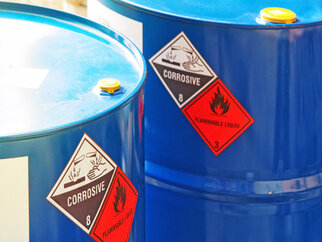Although they play a key safety role, dangerous goods labels remain a constant source of uncertainty in many companies. Among the regular issues are ones concerning the tracking of layout updates, high procurement and inventory costs, and the labels’ material properties, typically relating to their seawater resistance and the call for greater sustainability. In order to make the procurement and use of dangerous goods labels more dependable, simpler, less costly, faster and kinder to the environment across all modes of transport, BOXLAB Services, a service provider and consulting company operating in the field of dangerous goods labelling and packaging, has now joined forces with the self-adhesive solutions specialist HERMA to launch a unique collaborative project. It encompasses all kinds of dangerous goods labels, from hazard labels and placards to warning signs (ADR warning plates). Whereas the customary minimum order quantities run into four or five-figure numbers for each type, the cooperation between BOXLAB Services and HERMA allows customers to obtain these products in batch sizes even as small as one – within 24 hours anywhere in Europe. In consequence, expensive inventories of multiple variants and, in some cases, the disposal of stock because of invalidation or expired shelf life can be avoided. “Our market experience to date shows that our approach can reduce procurement and process costs by as much as 50 percent,” says Mischa Feig, managing director and co-founder of BOXLAB Services. Labels are supplied on individual sheets or on rolls. BOXLAB Services offers legal certainty. It guarantees compliance with the current prescribed layouts for all regulated modes of transport (ADR, RID, IATA and IMDG), which is especially important in view of the fines that can be imposed in case of incorrect labelling. The company also takes back the siliconised liner material for recycling. “This sustainable pro-environmental service for dangerous goods labels is thought to be unprecedented as well,” explains Feig. BOXLAB Services was spun off from BASF SE as an autonomous start-up and is also the first enterprise to have emerged from that company’s business incubator. Mischa Feig had previously gathered many years of experience with BASF in its dangerous goods handling unit.
Crucial combination of suitable materials
As a developer and producer of adhesive materials, and given its long-standing experience with labels for the chemical sector, HERMA’s role within the project focuses on selecting appropriate material combinations according to current regulations, and printing the products in large quantities to the highest quality standards. “Dangerous goods labels have to stick reliably to a wide variety of containers, including barrels, drums, canisters, shipping containers, IBCs, FIBCs and bottles, as well as shrink-wrapped pallets, and therefore to numerous different surfaces,” comments Sven Pleier, the responsible HERMA Key Account Manager Depending on the intended application, resistance to chemicals, such as acids, alkalis and solvents; dirt; grease; oil; environmental influences, including heat, humidity, low temperatures, UV exposure and seawater, is also required. “The appropriate choice of resistant, flexible and printable label films; of adhesives with a broad temperature range that are compatible with a variety of surfaces; and of lightfast printing inks offering seawater resistance in compliance with British Standard (BS) 5609 Section 3 if necessary, is extremely important.” BOXLAB Services, which has its own warehouse, takes care of operational management, i.e. the ordering and shipping procedures, as well as making up orders and, where necessary, subsequent customisation of the dangerous goods labels. “The individual print impression produced by our certified printers with the appropriate ink in combination with HERMA’s materials also satisfies the seawater resistance requirements of BS5609 Section 3,” stresses Mischa Feig of BOXLAB Services. “We strive in particular to find the best possible solution for each individual customer, for instance by combining different layouts in one label.” BOXLAB Services can provide users with additional peace of mind throughout the labelling process by supplying an eco-friendly cleaner for preparing surfaces to accept the dangerous goods labels, and a special scraper for removing the labels cleanly after use. In conclusion, Mischa Feig remarks, “In many companies, the process steps involved in labelling dangerous goods remain unsatisfactory. We are therefore delighted now to be able to offer, together with HERMA, innovative solutions that are well-conceived and thoroughly dependable right from the start, including in very small quantities.”
Detailed information on the products can be found on the HERMA website:
Detailed information on the products can be found on the HERMA website:
